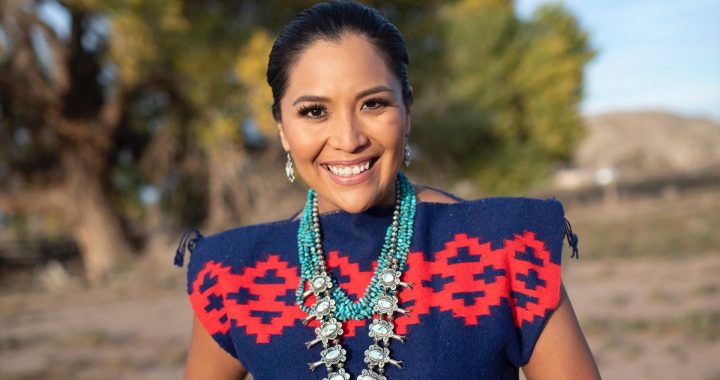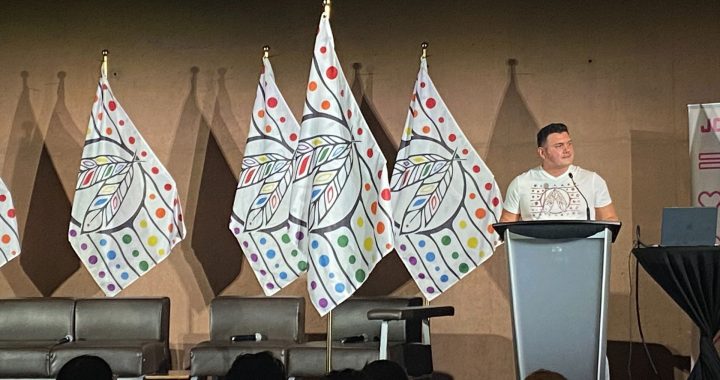For the past two decades, Sandra Delaronde has been an advocate for missing and murdered Indigenous women, girls and Two-Spirit people.
Now, she’s leading a committee called Gganwenimaanaanig – Ojibwe for We Take Care of Them All – tasked with holding governments and Canadians accountable when it comes to implementing the 231 calls to justice from the National Inquiry into Missing and Murdered Indigenous Women and Girls (MMIWG).
Part of her role is helping others find their voices, including on an August evening at the Ma Mawi Wi Chi Itata Centre in Winnipeg’s North End, where a small group of support workers discuss the impact of the recent trial of convicted serial killer Jeremy Skibicki.
Delaronde said getting community input is important for the courts and public records.
“When we have a loss, it isn’t just one person or one family that’s injured,” Delaronde said. “It’s the whole community that experiences the injury.”
Read more:
Skibicki trial hears from psychiatrist
Skibicki, 37, was found guilty on July 11 of four counts of first-degree murder for the brutal killings of Rebecca Contois, 24, Morgan Harris, 39, Marcedes Myran, 26 and the yet-to-be-identified victim given the name Mashkode Bizihiki’ikwe or Buffalo Woman by First Nations leaders.
While delivering a summary of his decision, Chief Justice Glenn Joyal said he would reserve sentencing so family members, friends and communities could prepare victim impact statements.
“It’s a small step; it means that the courts are listening to the community,” said Delaronde. “Even in Justice Joyal’s summary he talked about the greater issue of MMIWG, however, he just had to consider the evidence that was before him.”
Delaronde said this particular case was different from past verdicts where non-Indigenous men were on trial for killing Indigenous women in Winnipeg.
Normally, victim support workers put the needs of families first, but on this night it’s about them.
Everyone in this sharing circle knows of a woman or girl who’s gone missing or been murdered from their family and their community.
‘For the families, it’s not ever going to be over’
Stanley La Pierre is the lone male in attendance. He’s used to it.
But it has him questioning where his peers are.
“We have many, many of these gatherings (and) where are our males? Where are our healthy males?” La Pierre said.
La Pierre is the partner of Thelma Morrisseau, a well-known and respected Indigenous elder in Manitoba.
He has been supporting the families of the victims since May 2022 when Skibicki was first charged following the discovery of the partial remains of Contois in garbage bins.
“For the families, it’s not ever going to be over,” he said. “They are going to go to bed at Christmas Eve or birthdays (and) Mother’s Day and they are going to think about their loved one they have lost.
“So it’s never over. Grieving – you can never ever tell someone how to grieve there’s no book on grieving.”
La Pierre said he’s exhausted but doesn’t plan on leaving the families any time soon. He said he’ll be beside them as the Brady Landfill search begins this October for the remains of Harris and Myran.
“It aged me because I had so many different emotions,” he said of how the Skibick trial affected him personally.
A man who lives by Midewiwin law, which is Anishinaabe teachings, said he has battled with his own thoughts.
“Some (of) those emotions were scary emotions,” he said. “I thought I had healed from those emotions years gone by but they surfaced when that individual was walking in that courtroom each and every day.”
‘I am putting them into visuals the best way I can’
Roxanne Greene of Shoal Lake 40, a small First Nation near the Manitoba-Ontario border, is a graphic illustrator helping gather impact statements for Skibicki’s upcoming sentencing hearing.
“I am putting them into visuals the best way I can that shows the many emotions and feelings that I’ve been hearing,” Greene said.
She said she went into ceremony and prayed for guidance prior to taking on this “sacred” responsibility.
Greene said there will be five graphic boards from five different community sessions: two from Winnipeg, two from northern Manitoba in The Pas and Thompson, and one from Brandon.
The first board was created on July 21 in Winnipeg, nearly two weeks after Skibicki was convicted.
“The title of that one is called It’s a Horror Story, but it’s a true story. There is an eagle depicted in the picture with the wing branching up high and that’s where the Elders are at the top, giving the community the supports they need so they are able to share these statements with all of us,” Greene said.
This latest session came just days after the discovery of Mackenzie Trottier’s remains in the Saskatoon landfill.
“Especially in hearing about the news of the Saskatoon landfill search and it resulted in them finding the young woman that was missing gives the community there a sense of hope for these women,” Greene said.
The graphic illustrations will be added to a report written by Delaronde. They will be shown in court during Skibicki’s sentencing hearing in Winnipeg Court of King’s Bench on August 28.









